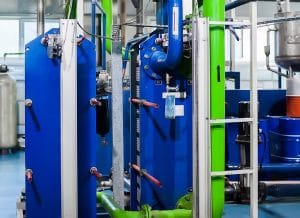 The processes involved with electrical thermal management are one of the few concerns that are shared across every industry. For that reason, improvements in thermal management have impacted virtually every industry, usually for the better. As those advancements have continued over the last few decades, the realm of thermal management has extended beyond just modern electrical cooling processes. For example, in industries that involve the rapid removal or precise application of heat, the ability to transfer it efficiently with advanced heat exchangers has had an even greater impact for most companies’ operations.
The processes involved with electrical thermal management are one of the few concerns that are shared across every industry. For that reason, improvements in thermal management have impacted virtually every industry, usually for the better. As those advancements have continued over the last few decades, the realm of thermal management has extended beyond just modern electrical cooling processes. For example, in industries that involve the rapid removal or precise application of heat, the ability to transfer it efficiently with advanced heat exchangers has had an even greater impact for most companies’ operations.
When it means promoting efficient processes
Efficiency has always been a central focus for modern electrical thermal management systems. The faster and more effectively a system can eliminate waste heat, the more efficiently electrical systems can operate. However, electrical cooling isn’t the only thing that becomes more efficient with the help of modern heat exchangers, and they’re advanced heat transfer capabilities have proven essential for several industry-specific processes. For example, the use of advanced heat exchangers has helped improve processes like pasteurization in the food and beverage industry and machine tool cooling within molding companies. Even high-powered computing and electronics devices have benefited from heat exchangers’ ability to rapidly transfer heat with minimal energy and space.
When it means supplementing energy
Companies in various industries have grown more comfortable relying on heat exchangers for processes outside of electrical cooling. That comfort has led to the even greater implementation of heat exchangers across industries, and for a wide range of applications. Many forward-thinking applications multiply the benefits of heat exchangers by utilizing them for more than just cooling processes. For example, companies in various industries have implemented wastewater treatment processes at increasing rates, which can potentially raise costs by a large margin. Most of that margin consists of additional energy costs; however, by utilizing heat exchangers, companies can often supplement those costs by repurposing the electrical waste heat they collect.
When it’s key to green energy initiatives
The use of repurposed electrical waste heat has been an important development in many different ways. However, it hasn’t been the only benefit that heat exchangers have had in the realm of green energy initiatives. The way heat exchangers transfer waste heat – by using a fluid to absorb it and redirect it – is a highly eco-friendly process by itself. Transferring heat requires little energy, and the fluids that most heat exchangers use are also eco-friendly (such as water). For more information about how thermal management often means more than usual, call Noren Thermal Solutions in Taylor, TX, at 866-936-6736.







